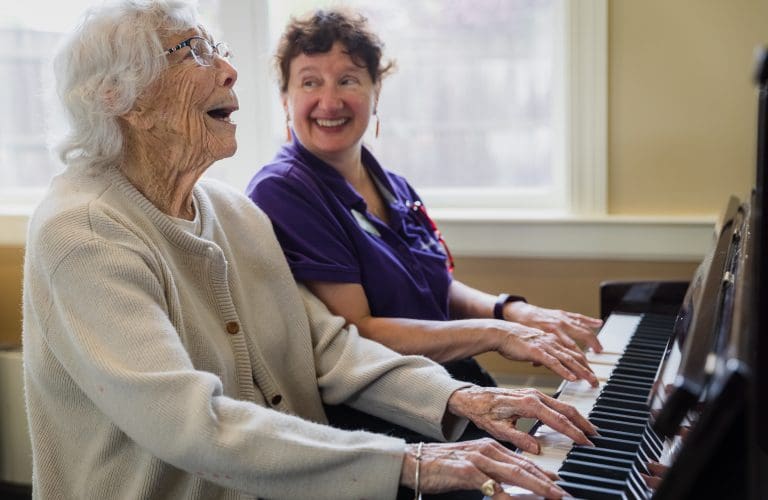When to Move to Memory Care – The Window of Opportunity

When we hear the phrase, ‘Window of Opportunity’ we often think of perfect timing – maybe it’s changing careers, moving to a new house, or as kids – that perfect time to ask Mom for that thing you knew you shouldn’t have.
We don’t often think of Memory Care, Assisted Living or Senior Living. Just like finding the perfect time to ask mom for something as a kid, there is a window of opportunity when it comes to memory care.
The window of opportunity is this ideal moment in time where everything lines up and makes the ask, task or decision a little bit easier.
Catching dad on a good day, and mentioning that it might be nice to have someone come in to help him cook 3 times a week.
Seeing mom struggling to walk up the stairs on her own, and mentioning downsizing to one floor of living, or coming to stay with you.
Recognizing that your wife is starting to decline cognitively and wanting to make the best decision to set her up for success in her care journey.
So, when is the window of opportunity to move someone into a memory care assisted living community?
Wouldn’t it be great if we could tell you it was after the 10th doctors appointment, or that your loved one will tell you that they’re in the window of opportunity and now is the perfect time?
Sadly, it’s not that simple. Everyone’s window of opportunity is different and stays open for varying amounts of time. Where a person is in the dementia journey is probably the biggest proponent of when this window of opportunity will come about. What we can tell you are signs to look for and notice that might indicate you are in your window of opportunity to make the move to memory care.
The ideal time to make the move to memory care for someone who is living with memory impairment is when:
- They are high functioning.
- Have some level of independence.
- Are able to adjust, adapt and acclimate to life at the community.
- Be in the present moment and grasp what is going on around them.
This isn’t to say that when you feel the window of opportunity has closed, your loved one won’t have success in moving to a memory care assisted living community. At Northbridge our Avita memory care communities and neighborhoods work tirelessly to make the transition as easy as possible for the resident and their family.
We want to touch on a few benefits of moving into a memory care assisted living community or neighborhood during this elusive ‘window of opportunity’ both for the resident and for their families.
Benefits for the resident:
A resident being able to share and accurately articulate what is important to them and what makes them comfortable goes a long way to making the community feel like home for them and a safe place.
Being able to work with the same community caregivers on a daily basis creates strong relationships and builds trust between the resident and the caregiver.
When the time comes that a resident needs more care, maybe changing or showering, they already have established relationships with caregivers built on trust which leads to less resistance in receiving care.
Benefits for the family:
Prevents caregiver burnout – you often don’t realize you’ve become a caregiver until you start feeling overwhelmed by it. Making the move earlier can help with the overwhelming asks of being a caregiver.
Don’t wait until you start to feel feelings you aren’t comfortable with – sometimes, people don’t realize they’ve gone from being the spouse to being the caregiver until they start noticing feelings of resentment. This can change the relationship. It’s important to maintain a level of respect within the relationship. This can often be challenging when one person is caring for the other.
You often don’t realize how much you do until you are able to take a step back from that caregiver role and find balance again within your life.
All this is not to say that you can’t find success while having your loved one live at home or with you during this ‘window of opportunity’. There are many resources available to help and support along the way. Look into support groups, the Alzheimer’s Association offers a variety of support groups both in person and online – click here to find one near you. Find your support system and don’t be afraid to ask for help, talk with family and friends about what you might need to create the best situation for everyone while caring for your loved one. There are also Adult Day Programs designed to keep the person with memory impairment engaged, entertained and cared for while you (the caregiver) can get a reprieve from the daily tasks and routine you find yourself in. In Maine, our Avita Memory Care communities offer a Living Well Adult Day Program. This program allows caregivers to drop their loved ones off during the day and be assured they will be cared for, experience engaging programs and enjoy delicious and healthy meals. It is also a great option for someone considering the move to a senior living memory care community and wants to see if their loved one will be successful in that environment.
If you would like to learn more about the Living Well Adult Day program at an Avita near you contact:
Avita of Wells – Lisa Nassif: lnassif@avitaofwells.com
Avita of Stroudwater – Cally Brake: cally@avitaofstroudwater.com
Avita of Brunswick – Bethany Tyler: bethany@avitaofbrunswick.com
We’re here to answer any of your questions and invite you to download our complimentary guide Just the Facts: Memory Care. Please contact us if we can provide further information or if you would like to schedule a personalized tour.